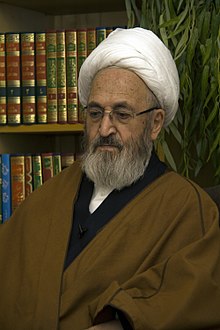Ja'far Sobhani
Grand Ayatollah Jafar Sobhani آيت الله العظمى جعفر سبحانى | |
|---|---|
 Grand Ayatollah Jafar Sobhani | |
| Member of the Assembly of Experts for Constitution | |
| In office 15 August 1979 – 15 November 1979 | |
| Constituency | East Azerbaijan Province |
| Personal details | |
| Born | 9 April 1929 Tabriz, Iran |
| Political party | Society of Seminary Teachers of Qom |
| Other political affiliations | Muslim People's Republic Party (1979) |
| Children | Saeid Sobhani |
| Website | http://tohid.ir/ |
| Religion | Islam |
| Denomination | Twelver Shīʿā |
| School | Jaʿfari |
| Main interests | Theological work |
Grand Ayatollah Jafar Sobhani (Persian: جعفر سبحانی; born 9 April 1929)[1] is an Iranian Twelver Shia marja, influential theologian and writer. Sobhani was a former member of the Society of Seminary Teachers of Qom and founder of Imam Sadiq Institute in Qom.[2][3][1]
Education
[edit]Ayatollah Ja'far Sobhani learned Arabic literature, Principles of Islamic jurisprudence in the Islamic Seminary. In 1946, he went to Islamic Seminary in Qom. In the Islamic Seminary, he took part in famous teachers' classes of Fiqh, Usool, Tafsir, and philosophy. Sobhani's important teachers were Seyyed Hossein Borujerdi, Khomeini, and Mirza Sayyed Mohammad Tabatabai near 15 years.[4]
Activities
[edit]- Qom Islamic Seminary's lecturer and scholar in Fiqh, Principles of Fiqh, history,rijal and theological studies[4]
- Founder and director of Maktabe Islam magazine[4]
- Founder and director of Kalaame Islami magazine[4]
- Established an institute for theological research known as Imam Sadiq Institute[2]
- Participated in writing the Constitution of the Islamic Republic of Iran[1]
- Writer of a thematic interpretation of the Quran[1]
- Fighting with Wahhabism[1]
- Established the field of Ilm al-Kalam[1] in the seminary of Qom
- Published more than 300 researches[2]
Books
[edit]He has several Arabic and Persian books that are categorized in seven fields as Fiqh, Principles of Islamic jurisprudence, Tafsir, Ilm al-Kalam, Philosophy, History of Islam, and Biographical evaluation. In 2001, Doctrines of Shi'i Islam: A Compendium of Imami Beliefs and Practices book (ISBN 1860647804) was translated into English and published by I. B. Tauris.[5] Some of his books include:
| # | Subjects | Books |
|---|---|---|
| 1 | Fiqh |
|
| 2 | Principles of Islamic Jurisprudence |
|
| 3 | Tafsir |
|
| 4 | Ilm al-Kalam |
|
| 5 | Philosophy |
|
| 6 | History of Islam |
|
| 7 | Beliefs |
|
| 8 | The Beliefs and History of the Islamic Sects |
|
| 9 | Biographical evaluation |
|
| 10 | Others |
|
References
[edit]- ^ a b c d e f "Biography of Ja'far Sobhani". hawzah.net. Retrieved 17 May 2015.
- ^ a b c "H.E. Ayatollah Jafar Sobhani". themuslim500.com. Retrieved 17 May 2015.
- ^ "Ayatollah Ja'far Sobhani". iis.ac.uk. Archived from the original on 18 May 2015. Retrieved 17 May 2015.
- ^ a b c d "Sobhani، Ayatollah Ja'far". ijtihad.ir. Archived from the original on 18 May 2015. Retrieved 17 May 2015.
- ^ Sobhani, Ayatollah Ja'far (27 September 2001). Doctrines of Shi'i Islam: A Compendium of Imami Beliefs and Practices. Bloomsbury Academic. ISBN 1860647804.
- ^ "التفسیر".
- ^ "Who is Muhammad?". avapress.com. 18 September 2013.

